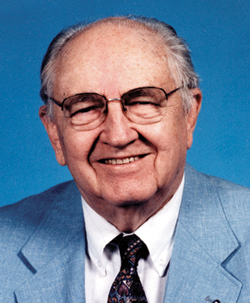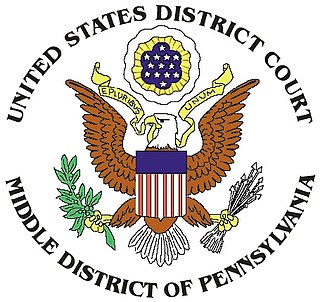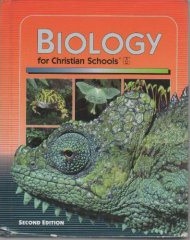Intelligent design (ID) is a pseudoscientific argument for the existence of God, presented by its proponents as "an evidence-based scientific theory about life's origins". Proponents claim that "certain features of the universe and of living things are best explained by an intelligent cause, not an undirected process such as natural selection." ID is a form of creationism that lacks empirical support and offers no testable or tenable hypotheses, and is therefore not science. The leading proponents of ID are associated with the Discovery Institute, a Christian, politically conservative think tank based in the United States.

The National Center for Science Education (NCSE) is a not-for-profit membership organization in the United States whose stated mission is to educate the press and the public on the scientific and educational aspects of controversies surrounding the teaching of evolution and climate change, and to provide information and resources to schools, parents, and other citizens working to keep those topics in public school science education. Based in Oakland, California, it claims 4,500 members that include scientists, teachers, clergy, and citizens of varied religious and political affiliations. The Center opposes the teaching of religious views in science classes in America's public schools; it does this through initiatives such as Project Steve. The Center has been called the United States' "leading anti-creationist organization". The Center is affiliated with the American Association for the Advancement of Science.
Edwards v. Aguillard, 482 U.S. 578 (1987), was a United States Supreme Court case concerning the constitutionality of teaching creationism. The Court considered a Louisiana law requiring that where evolutionary science was taught in public schools, creation science must also be taught. The constitutionality of the law was successfully challenged in District Court, Aguillard v. Treen, 634 F. Supp. 426, and the United States Court of Appeals for the Fifth Circuit affirmed, Aguillard v. Edwards, 765 F.2d 1251. The United States Supreme Court ruled that this law violated the Establishment Clause of the First Amendment because the law was specifically intended to advance a particular religion. In its decision, the court opined that "teaching a variety of scientific theories about the origins of humankind to school children might be validly done with the clear secular intent of enhancing the effectiveness of science instruction."

Michael Joseph Behe is an American biochemist and an advocate of the pseudoscientific principle of intelligent design (ID).

The Institute for Creation Research (ICR) is a creationist apologetics institute in Dallas, Texas, that specializes in media promotion of pseudoscientific creation science and interpretation of the Genesis creation narrative as a historical event. The ICR adopts the Bible as an inerrant and literal documentary of scientific and historical fact as well as religious and moral truths, and espouses a Young Earth creationist worldview. It rejects evolutionary biology, which it views as a corrupting moral and social influence and threat to religious belief. The ICR was formed by Henry M. Morris in 1972 following an organizational split with the Creation Science Research Center (CSRC).

Henry Madison Morris was an American young Earth creationist, Christian apologist and engineer. He was one of the founders of the Creation Research Society and the Institute for Creation Research. He is considered by many to be "the father of modern creation science". He coauthored The Genesis Flood with John C. Whitcomb in 1961.

Of Pandas and People: The Central Question of Biological Origins is a controversial 1989 school-level supplementary textbook written by Percival Davis and Dean H. Kenyon, edited by Charles Thaxton and published by the Texas-based Foundation for Thought and Ethics (FTE). The textbook endorses the pseudoscientific concept of intelligent design – the argument that life shows evidence of being designed by an intelligent agent which is not named specifically in the book, although proponents understand that it refers to the Christian God. The overview chapter was written by young Earth creationist Nancy Pearcey. They present various polemical arguments against the scientific theory of evolution. Before publication, early drafts used cognates of "creationist". After the Edwards v. Aguillard Supreme Court ruling that creationism is religion and not science, these were changed to refer to "intelligent design". The second edition published in 1993 included a contribution written by Michael Behe.

McLean v. Arkansas Board of Education, 529 F. Supp. 1255, was a 1981 legal case in the US state of Arkansas.
Robert T. Pennock is a philosopher working on the Avida digital organism project at Michigan State University where he has been full professor since 2000. Pennock was a witness in the Kitzmiller v. Dover Area School District trial, testifying on behalf of the plaintiffs, and described how intelligent design is an updated form of creationism and not science, pointing out that the arguments were essentially the same as traditional creationist arguments with adjustments to the message to eliminate explicit mention of God and the Bible as well as adopting a postmodern deconstructionist language. Pennock also laid out the philosophical history of methodological and philosophical naturalism as they underpin to science, and explained that if intelligent design were truly embraced it would return Western civilization to a pre-Enlightenment state.

Kitzmiller v. Dover Area School District, 400 F. Supp. 2d 707 was the first direct challenge brought in the United States federal courts testing a public school district policy that required the teaching of intelligent design (ID), ultimately found by the court to not be science. In October 2004, the Dover Area School District of York County, Pennsylvania, changed its biology teaching curriculum to require that intelligent design be presented as an alternative to evolution theory, and that Of Pandas and People, a textbook advocating intelligent design, was to be used as a reference book. The prominence of this textbook during the trial was such that the case is sometimes referred to as the Dover Panda Trial, a name which recalls the popular name of the Scopes Monkey Trial in Tennessee, 80 years earlier. The plaintiffs successfully argued that intelligent design is a form of creationism, and that the school board policy violated the Establishment Clause of the First Amendment to the United States Constitution. The judge's decision sparked considerable response from both supporters and critics.
Dean H. Kenyon is Professor Emeritus of Biology at San Francisco State University, a young Earth creationist, and one of the instigators of the intelligent design movement. He is the author of Biochemical Predestination.
Larry Caldwell, a pro-intelligent design activist and attorney, has been active in bringing litigation in causes supporting the intelligent design movement. Caldwell along with his wife, Jeanne Caldwell a Christian school teacher who "takes the Bible literally" previously operated Quality Science Education for All, and are currently appealing to the Supreme Court of the United States an Establishment Clause of the First Amendment suit against the University of California, Berkeley.

Neo-creationism is a pseudoscientific movement which aims to restate creationism in terms more likely to be well received by the public, by policy makers, by educators and by the scientific community. It aims to re-frame the debate over the origins of life in non-religious terms and without appeals to scripture. This comes in response to the 1987 ruling by the United States Supreme Court in Edwards v. Aguillard that creationism is an inherently religious concept and that advocating it as correct or accurate in public-school curricula violates the Establishment Clause of the First Amendment.

The Association of Christian Schools International (ACSI), founded in 1978, is an international organization of evangelical Christian schools. Its headquarters are in Colorado Springs, Colorado.

Daniel v. Waters, 515 F.2d 485 was a 1975 legal case in which the United States Court of Appeals for the Sixth Circuit struck down Tennessee's law regarding the teaching of "equal time" of evolution and creationism in public school science classes because it violated the Establishment clause of the US Constitution.

BJU Press is a publisher of textbooks for Christian schools and homeschools as well as trade and children's books.

This timeline of intelligent design outlines the major events in the development of intelligent design as presented and promoted by the intelligent design movement.

Biology for Christian Schools is a 1991 school-level biology textbook written from a Young Earth Creation point of view by William S. Pinkston and published by the Bob Jones University Press. The book has been controversial because it espouses the idea of Biblical inerrancy; that whenever science and Christianity conflict, the current scientific understanding is wrong. The book promotes creationism, which is rejected by the National Academy of Sciences, the National Association of Biology Teachers and the National Science Teachers Association who state creationism and intelligent design are pseudoscience.

Samuel James Otero is a former United States district judge of the United States District Court for the Central District of California.
In American schools, the Genesis creation narrative was generally taught as the origin of the universe and of life until Darwin's scientific theories became widely accepted. While there was some immediate backlash, organized opposition did not get underway until the Fundamentalist–Modernist controversy broke out following World War I; several states passed laws banning the teaching of evolution while others debated them but did not pass them. The Scopes Trial was the result of a challenge to the law in Tennessee. Scopes lost his case, and further U.S. states passed laws banning the teaching of evolution.













